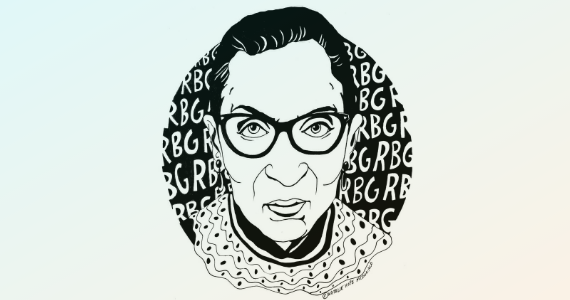Ruth Bader Ginsburg and Public Health
Posted on
September 29, 2020
 Illustration by Natalie Hope McDonald
Illustration by Natalie Hope McDonald
By Ana V. Diez Roux, MD, PhD, MPH
When I was in medical school and someone asked me what kind of specialty I wanted to go into, I remember saying “I’m not sure, but certainly not pediatrics.” I said this because I knew that being a pediatrician is what most people expected a woman doctor to be. I had no idea at the time what pediatrics entailed, but I was determined to avoid the stereotype. Paradoxically after I rotated through the Hospital Ricardo Gutierrez, a large sprawling children’s hospital in the middle of Buenos Aires, I realized that pediatrics was after all the specialty for me. But not because I was woman; because of the way pediatrics inevitably focused on prevention, on populations, and brought the social world into the clinic.
Public health has long had a focus on the health of children, and more precisely on the health of women and children. Maternal and child health programs are a hallmark of efforts to improve health globally. Women’s health is often emphasized in the context of infant and child health and family health as women are rightly perceived to be primary care takers of children, spouses, and parents. Other aspects of women’s health unrelated to childbearing and reproductive health often receive less attention. Stereotypes abound: women are believed to have less heart disease and more mental health problems, it is claimed that they overuse health care services, and generally complain more about their health than men.
The death of Ruth Bader Ginsburg has generated much reflection on the law and women’s rights. Justice Ginsburg’s major health related contributions include her support of access to abortion and reproductive health care services for women. She was also part of the U.S. Supreme Court majority that has so far upheld the Affordable Care Act. But of course the public health impact of Ginsburg’s work, from the time she was a litigator and Director of the Women’s Rights Project of the ACLU in the 1970s to the powerful opinions that she wrote as a U.S. Supreme Court Justice, extend far beyond issues related to abortion, reproductive rights, and health care access important as they are.
A stalwart supporter of equal rights for women, Justice Ginsburg made much broader contributions to society and public health. As Director of the Women’s Rights project she brilliantly argued many cases against the gender discrimination that was operating in both subtle and blatant ways, sometimes hidden in laws that ostensibly “protected “women. In landmark Supreme Court opinions, she continued to make a forceful and compelling case to eliminate gender discrimination in education and work. But as noted in the obituary recently published in The New York Times, “…for Ms. Ginsburg, something deeper and more radical was at stake. Her project was to free both sexes, men as well as women, from the roles that society had assigned them…” The implications of such a transformation for society and for the well-being and health of all of us cannot be overstated.
Twenty-five years ago, the Beijing Declaration and Platform for Action adopted by 189 countries laid out a framework for achieving equality between men and women as a fundamental condition for social justice and sustainable development. Yet a Lancet editorial published earlier this year noted that “perhaps the most striking feature of the past 25 years has been the neglect of gender equality by mainstream public health and development programming.”
Inequities, discrimination, and violence based on gender identity and sexual orientation remain rampant across the globe. Gender inequality, discrimination and restrictive gender norms affect health through multiple interrelated pathways and potentiate and compound the effects of racism, classism, and homophobia. As noted by Clark and Horton, “efforts towards gender equality for improving health must be explicitly feminist, intersectional, and global, with an emphasis on structural and institutional level change.” Laws and policies that promote equity (including education and leave policies) can make a real difference in population health.
I have never regretted choosing pediatrics. The insight it gave me into people’s lives and into the pervasive effects of inequities and injustice is something I still remember vividly. Despite stereotypes I chose what I wanted to do, and although I can’t say that I have not experienced gender bias (a high level administrator once asked me how I had “managed” to get an office bigger than a male colleague and even today occasionally someone “explains” things to me when I express disagreement) I have had a life full of opportunity. But this is by far not the norm for women globally. Perhaps today at a time of so much challenge and upheaval, we will see a way forward to truly address gender inequities along with the other social and racial inequities with which they are so tightly entwined.